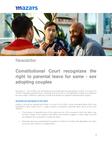
Constitutional Court recognizes the right to parental leave for same - sex adopting couples
Accused rule and bases for the claim
Initially, it should be recalled that Article 2 of Law 2114 of 2021, which amended Article 236 of the Substantive Labor Code (C.S.T.), made a series of changes to parental leave, some of the most relevant:
- The inclusion of abandonment of the mother as one of the causes for which the father may be left in charge of the newborn child without the mother's support, in which case he would be entitled to the recognition of maternity leave.
- Maternity leave was extended by two weeks for mothers of children with disabilities, the same as occurs with mothers of multiple births.
- Paternity leave was extended from 8 working days to 2 weeks, being able to benefit not only the husband or permanent partner of the mother but also the adopting father.
- The weeks of contribution required for the recognition of paternity leave were modified, changing the expression "previous weeks" (which had raised several interpretations by the administrative authorities) and establishing that paternity leave will be recognized proportionally to the weeks contributed by the father during the gestation period.
- Shared parental leave and flexible part-time parental leave were created.
Although the aforementioned norm introduced important and necessary changes for the recognition of parental leave, its wording was based on binary categories on sexuality, understanding the family as that made up of a man and a woman, which is why, in the claimant's opinion, it did not recognize the right of homoparental or same-sex couples to maternity, paternity and shared and flexible parental leave, since from the reading of the regulation it was not possible to establish which leaves they could enjoy, nor the number of weeks that should be granted through the Social Security System.
Rationale of the Court and decision
First of all, the Court reiterated that same-sex families have the same rights as heterosexual families, that they may enter into civil marriages and adopt, and form a household with children. It also recalled that the Political Constitution of Colombia proscribes discrimination for any reason, including that related to sexual orientation. In this regard, it highlighted that jurisprudence has established:
- The mandate of prohibition of discrimination based on sexual orientation implies that the enjoyment and exercise of rights cannot be restricted when deciding on a sexual option;
- At present, similar legal treatment is recognized for heterosexual couples and same-sex couples;
- Such equal treatment allows access to the General Social Security System, in all its components, with the same guarantees assigned to heterosexual couples;
- Homoparental families are guaranteed not only the right to marry, but also the right to adopt and assume the obligations that this implies.
Thus, and after reviewing the accused norm, the Court pointed out that the legislator effectively incurred in a legislative omission since it excluded from the normative assumptions the legal consequences for those families formed by people of the same sex. It stated that one of the main objectives of parental leave is to guarantee the best interests of children and adolescents and the effective enjoyment of their rights, especially love and care and the active and responsible role of families in their integral development, an objective that was not fulfilled by excluding from the norm the recognition of parental leave for same-sex families that adopt.
Accordingly, the Court decided to declare the challenged provision constitutional, clarifying that same-sex couples were entitled to the same leave and that, in these cases, it would be up to the members of the adopting same-sex couple to define, on a one-time basis, who would enjoy each benefit under the same conditions provided for heterosexual adopting families.
Additional considerations
The decision of the Constitutional Court is a great step forward in the recognition of the rights of family models other than the binary (woman and man), however, it does not completely solve the problems that may arise at the time of recognition of parental leave for these couples, as pointed out by Justice José Fernando Reyes Cuartas in his clarification of vote[1].
According to the magistrate, the conformation of the families of same-sex couples is diverse and, therefore, can be structured in various ways, as it happens:
- When the same-sex couple adopts a minor. In this case, neither is the biological father or mother.
- When the minor is the biological child of one of the women of the same-sex couple and her partner adopts him/her.
- When the minor is the biological child of one of the male members of the same-sex couple and is adopted by his partner.
Such diversity, consequently, implies a specific regulation on the treatment that should be given to each adoptive father and mother, of same-sex couples, when claiming the leave that corresponds to them. Thus, according to the magistrate, the sentence in question covers only the first case, that is to say, the one that occurs with the adoption of same-sex couples when the child is not the biological child of either of them, which is why the normative gap will remain for the last two cases until the legislator regulates them.
[1] Constitutional Court, communiqué 39 of November 23, 2022.
Want to know more?


